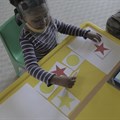The Thrive by Five Index 2024, the most comprehensive national dataset collected on early childhood development in South Africa, was launched by the Department of Basic Education, in partnership with DataDrive2030, last week.

Supplied image
The index provides a critical snapshot of how four-year-olds across the country are developing across three core dimensions: early learning, physical growth, and social-emotional functioning.
This second iteration of the index builds on the foundation laid in the 2021 report, with expanded scope, methodological rigour, and, for the first time, a sub-study focused on children not enrolled in any early learning programme (ELP). In total, over 5,000 children enrolled in ELPs were assessed, alongside more than 270 children who are currently excluded from formal early learning opportunities.
“The early years are the foundation of a child’s development, and they set the chart on which direction children will most likely go in life. However, too many young children, particularly in rural and under-resourced communities, are not receiving the appropriate building blocks and are being left behind,” said Minister of Basic Education, Siviwe Gwarube.
“The Thrive by Five Index is a crucial tool to guide urgent, focused action. If we want to build a stronger, more stable education system, we must start at the beginning. When a child learns to read with meaning, solves problems with confidence, and feels supported in the classroom, they begin to realise their own potential, and that’s where lasting change begins.”
Key findings: A mixed picture of promise and concern
The Thrive by Five Index 2024 reveals that while many children are making healthy progress, the majority are not developmentally on track for their age. Among children enrolled in ELPs, only 42% are on track in key areas of early learning. A further 28% are falling behind, and 30% are significantly behind, a stark signal of systemic inequities.
Particularly concerning are the findings related to emergent numeracy and fine motor skills:
- Only 33% of children are on track for emergent numeracy and mathematics, foundational skills that underpin future success in Stem fields.
- Just 29% are on track for fine motor coordination and visual motor integration, which supports literacy, writing, and everyday classroom functioning.
Across all developmental domains, girls consistently outperform boys, highlighting gendered disparities in early development. Children attending no-fee or low-fee ELPs are also significantly less likely to be on track than their peers in higher-fee centres, an indication of how deeply access to quality early learning is shaped by socio-economic status.
“The Thrive by Five Index directly supports South Africa’s goal of achieving universal access to quality early learning for every child by 2030,” said Sonja Giese, executive director of DataDrive2030. “But we have a long way to go. The index is not just another report. It is a wake-up call - a clear signal that we cannot afford to ignore the early years of our children’s lives.
"More than half of children entering Grade R are coming into the schooling system without the basic skills they need to cope well. This is the current picture of SA children. This picture does not belong to one department, or one sector. It’s a picture that affects every South African. South Africa cannot thrive unless its children do.”
Annelize Clark 18 Aug 2025 Growth and nutrition: Stunting impedes learning
The index also reveals troubling patterns in physical growth.
Among children in ELPs: 7% are moderately or severely stunted.
Stunting, an indicator of chronic undernutrition, is linked with poorer cognitive performance. By age four, stunted children are already around five months behind their non-stunted peers in cognitive development.
The findings are especially sobering for children outside formal learning systems. Among non-enrolled children in the sub-study, 18% are moderately or severely stunted, only 18% are on track for early learning, and over 80% are falling behind in foundational skills. The sub-study shows that being outside an ELP, particularly in low-income communities, dramatically reduces a child’s chance of developmental success.
Emotional and social well-being: Predictors of future learning
The index also highlights the importance of social-emotional readiness. 56% of enrolled children meet the benchmark for Emotional Readiness, and 63% for Social Relations with Peers and Adults. Girls again outperform boys in these domains.
Critically, emotional readiness emerged as a strong predictor of overall early learning outcomes, underscoring the need for nurturing, responsive environments that foster self-regulation, curiosity, and resilience.
Laying the foundations for a better future
The findings make clear that early learning is the foundation on which all future educational achievement is built. Without urgent investment in high-quality early learning, especially in under-resourced communities, efforts to address South Africa’s literacy crisis will falter.
As Minister Gwarube noted, “The future of our education system depends on what happens in the first five years of life. If we fail there, we set children up to struggle. But if we get it right, if we invest where it matters most, we create a generation of learners who are confident, capable, and ready to thrive.”












































